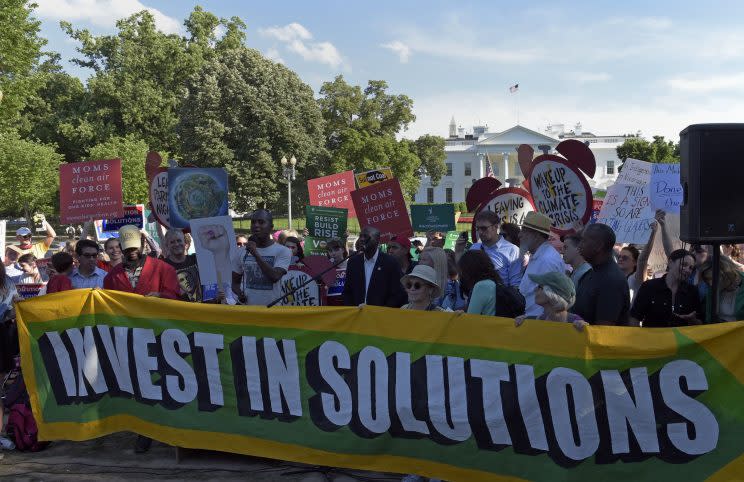Does the Paris Agreement really hurt the economy?

The United States would lose 6.5 million jobs and $3 trillion in gross domestic product if it had remained in the Paris climate agreement, President Trump said Thursday in announcing that the U.S. would reject the deal.
“The Paris climate … [leaves] American workers, who I love, and taxpayers to absorb the cost in terms of lost jobs, lower wages, shuttered factories and vastly diminished economic production,” Trump said.
Opponents of the agreement typically cast the issue as one of economic growth versus environmental benefits. But many economists and big businesses, even in the energy industry, believe that the agreement benefits the U.S. and could create jobs in clean energy and technology sectors.
Major companies including Walmart, Royal Dutch Shell and Apple say that the deal would foster competition among major industry players, job creation and free markets.
Related slideshow: Droughts, floods, storms and more: what climate change looks like around the world >>>
Those who oppose the accord, including senior adviser Steve Bannon, cite concerns that compliance with the deal and carbon dioxide emission regulations would damage the U.S. economy and harm jobs in industries like coal mining.
But according to former President Barack Obama, “the private sector already chose a low-carbon future.”
“The Paris Agreement opened the floodgates for businesses, scientists and engineers to unleash high-tech, low-carbon investment and innovation on an unprecedented scale,” Obama said.
The agreement would bring the U.S. a “job shift” rather than any major gains or losses, Roberton Williams, a director at Resources for the Future, told NPR.
“You get significant drops in some of the industries, you get significant gains in green jobs … and you get much smaller effects in a range of other industries, but it’s mostly jobs moving rather than jobs leaving or arriving,” Williams said.
Even Trump’s own senior advisers, including Secretary of State Rex Tillerson, have shared their support for the Paris deal. Tillerson, a former Exxon Mobile executive, has said that it’s possible for the reduction of carbon emissions and job growth to occur simultaneously.
Trump promised during his presidential campaign to resurrect the coal mining industry. But many believe that industry is on its last legs, with a string of coal mining companies declaring bankruptcy in the last several years.
“There is nothing that is going to stop the decline in the number of people that work in coal because the use of coal is going down given its problems and cheaper alternatives,” former New York City Mayor Michael Bloomberg said in April.
Remaining in the agreement could create new jobs in the energy sector. Additionally, the U.S. stands to lose jobs in the power industry if it rejects the agreement, U.N. environment chief Erik Solheim predicted in May.
The country currently employs more people in the green technology sector, with about 347,000 employees, than the coal industry, which has about 160,000, according to the Associated Press.
“The future is green,” Solheim said. “All the interesting, fascinating new green jobs would go to China and to other parts of the world that are investing heavily in this.”
Chief executive of Royal Dutch Shell Ben van Beurden expressed similar sentiments, telling the Financial Times he believes that “[there’s] a lot of business here that potentially could be at a disadvantage because of [the] implications of that decision to pull out of Paris.”
Energy experts predict that carbon regulations will eventually be implemented, regardless of whether the U.S. adheres to the climate change deal. As such, energy companies such as Shell and General Electric are preparing for a low-carbon energy future.
Tom Carnac, former president of CDP North America, which collects and now houses the world’s largest source of self-reported corporate environmental data, told the New York Times that potential future carbon regulations have become part of companies’ decision-making process regarding investments in the future.
“Companies see that the trend is inevitable,” Carnac said.
Read more from Yahoo News:
European Commission head says Trump doesn’t understand how Paris Agreement works
Bai: Forget Trump’s bluster. The world is walking all over him.
Clinton: Comey liked to talk about my emails but not investigation of Russians
Photos: Heavily armed men storm hotel and a casino resort in Philippine capital


